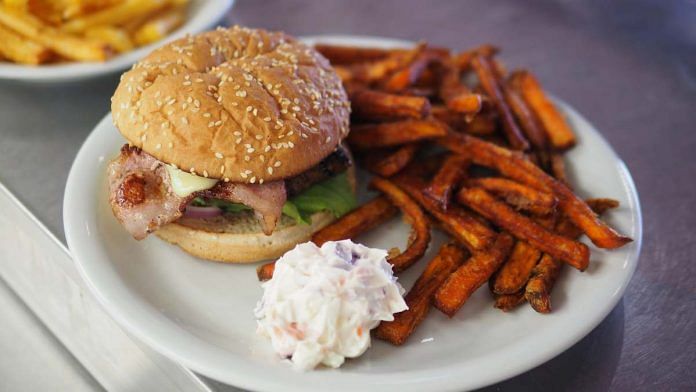Woke liberals to Right-wing conservatives, everyone has found a new target for their politics. Children. And what they watch and read. From beef to witches, it seems children must be ‘saved’ from what the thought-controllers of the Left and Right approve of and find appropriate. In a gentle nod to the BJP and RSS’ Hindutva politics in India, Disney+ Hotstar has been found censoring the popular animated series DuckTales. The censorship pertains to — no surprise — beef.
At a time when we are living through the Covid-19 pandemic, ‘sanitisation’ is a word we all live by. However, the concept of sanitisation seems to have been taken a bit too far when it comes to censoring content for children — and harmless content at that.
All spoken mentions of beef have been erased from DuckTales, including the word ‘ham’ in hamburger, despite it still appearing in the English subtitles.
It’s not a big surprise, even though it is still hilarious, that the ‘hamburger’ has now been changed to ‘cheeseburger’, which in reality also refers to a beef burger, but with cheese. And who will tell them that hamburger has nothing to do with ham, but comes from the place Hamburg in Germany where it originated.
Meanwhile, in the United States, a few self-proclaimed witches have raised objections to the classic Grimm’s fairy tale Hansel and Gretel being taught in schools. It apparently represents ‘witches’ in an objectionable manner and “nurtures the same hatred that once led to witch burnings”.
Also read: The itch of mainland Indians to ‘civilise’ northeast hasn’t gone. Dog meat ban another example
‘Appropriate behaviour’
Who gets to decides what counts as appropriate behaviour? In India, or even elsewhere, it’s clearly the majority — those in positions of power, evident from the kind of choices streaming platforms are making while self-censoring content. From text books to web series, ‘majority’ over alternative voices seems to be the norm. Although the witches may not agree.
Whatever is ‘approved’ might not have much logic behind it — or proper research, as the ‘cheeseburger’ example clearly shows — but since sanitisation is the norm, we ought to follow.
The larger agenda, however, remains clear — begin influencing popular culture early, so that only a certain kind of learning or ideology can prevail and dissent can be weeded away.
History of censorship
From England to India, ‘censorship’ of books, art or cinema have taken place over centuries. With the rise and popularity of print and online culture, calls for censorship have become even more inane over time.
In the US alone, from 1990 to 2000, the American Library Association reported 6,364 challenges to a range of books in libraries and public schools. Canada, too, reported attempts to censor various materials in one-third of its schools in the 1990s.
Even canonical children’s books such as The Diary of Anne Frank and Harry Potter series have undergone censorship in the past.
Also read: I ate the non-vegetarian Harappan meal and had no beef with it
The ‘beef’ with India
Global food chains like McDonald’s and Wendy’s are reluctant when it comes to picking bones with local laws and beliefs in India, and stay off beef and pork. In fact, McDonald’s world-famous hamburgers are not sold in India at all.
Considering most of its consumers are, again, children, this is both a business strategy, and simply safeguarding against backlash in the country that has recorded increasing intolerance when it comes to meat.
Pork does not create as much ‘offence’ as beef clearly, because the majoritarians are mostly okay with it, even though Muslims may not be.
Also read: ‘Better to have killed me’ — man thrashed by cow vigilantes says won’t transport meat again
Is it Left or Right?
While it’s a general tendency to blame the Right-wing for censorship or banning, evidence shows that this is not always accurate.
Professor of Library Science and censorship scholar Judith Saltman says that those who are advocates of censorship in children’s literature, and belong to the Left of the political spectrum, are becoming “uneasy bedfellows with the traditional advocates of censorship, those on the right”.
American writer and young adult novelist Malindo Lo, in her research on censorship in the last decade, found that books that fall outside the “white, straight, abled mainstream” are challenged/censored more often than ones that do not challenge the status quo. The subjects of such material could range from anything to LGBTQIA+ rights to disability, to race, or closer home, religion and caste.
Left or right, books or cartoons — it’s ‘my way or the highway’ for many. And beef in India is probably the furthest thing from ‘my way’ for vocal supporters of the BJP or Hindutva ideology. Seems like if we can ‘train’ our children to learn that beef is a ‘dirty’ word, we are on the route towards learning government-approved ‘best’ behaviour.
Views are personal.




Do people eat dogs and cats in the world? yes. Do they curtail themselves in countries where the Majority does not and imposes a ban? Yes…. So I don’t get the beef with beef. Again, clear intellectual dishonesty. The author tries to be balanced by presenting a case from the sphere of writing and authorship. Meh… that is a bit lame. Eating habits and what gets banned is mostly a majoritarian sentiment. It is so all over the world.
I support govt.